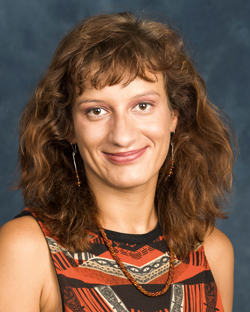By Donald H. Harrison


SAN DIEGO – Jana Mazurkiewicz Meisarosh, founder of the Yiddish Arts and Academics Association of North America (YAAANA), says many Americans mistakenly believe that Polish people are anti-Semitic.
In fact, she says, Polish people have an obsession with Judaism that leads some to be anti-Semitic and others to be just the reverse, philo-Semitic.
She should know. Herself a Jew from Poland, Mazurkiewicz now lives in University City with her Jewish husband Ed Meisarosh and is in the process of completing her doctoral thesis for the University of Michigan.
While studying on the Michigan campus, Mazurkiewicz wrote, directed, and performed in a play examining the Polish obsession with Judaism. The student production was videotaped, and will be screened at 7 p.m., Friday evening, February 22 at Royter’s Kitchen, 9265 Activity Road. A donation of $10 is suggested to view the production, which will be accompanied by challah, drinks, and party snacks.
The play, Wooden Wars Or Anybody Can Be A Jew These Days, is presaged with a film clip of Poles lining up at a store to buy Jewish figurines. Mazurkiewicz, in the role of television reporter, asks the people just why they want these wooden Jews. Most of the responses are humorous, but one suggests the underlying theme of the production, that the people of Poland in the aftermath of the Holocaust are engaged in the re-invention of memory.
So when sisters Ania (Sarah Garibova) and Zosia (Jamie Parsons) find what they believe is the diary of their great-grandmother, or prababcia, written in Yiddish, they resolve to learn as much as possible about her. Two of their friends, Jakub (Sara Feldman) and Tadek (James Nadel), join them in a séance, hoping to contact the long-dead great-grandmother. The trouble is, they can’t learn much because they don’t speak Yiddish.
Ania and Zosia decide to learn Yiddish, not an inconsiderable undertaking for two Catholic girls. The more they study the language, the more Judaized they become – so much so that Zosia decides to move to America where she thinks everyone speaks Yiddish and everyone is a movie star, while Ania remains in Poland, studying Yiddish with deep fervor.
Zosia eventually converts to American Reform Judaism, and also comes out as a lesbian. Ania also converts and marries a Chabadnik. Further contrasts are provided by their friends Jakub and Tadek. Jakub forsakes Yiddish to instead learn Hebrew preparatory to making Aliyah to Israel, while Tadek denounces the whole business and begins to sound like a drunken anti-Semite.
Other actors in the production – all of whom were affiliated with the University of Michigan as students or as a lecturer—played the parts of a wooden Jew (Caren Feldman) that came to life, Ania’s husband (Alexandra Hoffman), and the peddler (Sanders) who sells the wooden Jews.
In the second and final act, some of the participants in the original séance return to try again to contact Prababcia with surprising results. The play is performed in three languages – English, Polish, and Yiddish – and in the movie there are subtitles to help monolinguists.
Wooden Wars was performed at the University of Michigan in 2015, Mazurkiewicz informed me. Since then Sara Feldman, who portrayed both Jakub and Zosia’s American girlfriend “Jake,” has been hired as a lecturer in Yiddish at Harvard University. Alexandra Hoffman, at the time of the production, similarly served as a lecturer at the University of Michigan. She is now at the University of Toronto.
*
Harrison is editor of San Diego Jewish World. He may be contacted via donald.harrison@sdjewishworld.com